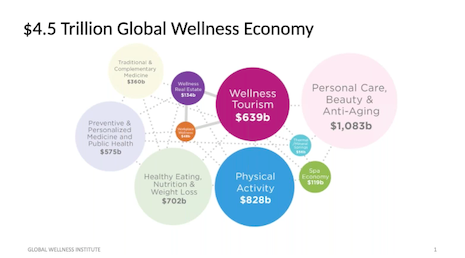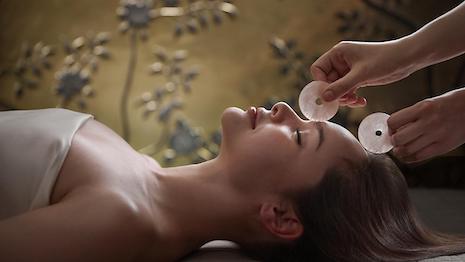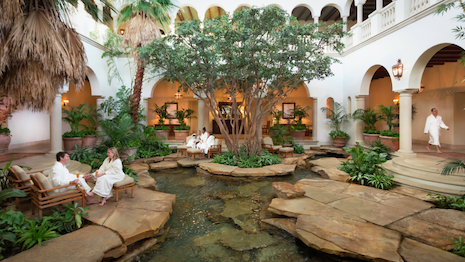Interest in wellness travel had been soaring among affluents prior to the pandemic, but experts are confident that this will resume as the luxury hospitality industry rebounds.
During a webinar on Oct. 14, “How to Achieve ROI for Wellness in your Hotels,” hospitality leaders discussed how to measure the success of wellness activities at hotels. In light of the pandemic, consumers have become more mindful of both physical and mental health.
“There is more interest now in wellness than ever,” said Susie Ellis, chairman/CEO of the Global Wellness Institute. “So we are very optimistic that actually there’s going to be more travel coming back that will be in the wellness sector than even in travel in general.”
The webinar was presented by the International Luxury Hotel Association and sponsored by A.T. Cross Company. The panel was moderated by Roger Allen, group CEO at Resources for Leisure Assets.
Responding to the pandemic
Prior to the COVID-19 pandemic, the hospitality industry had continued to invest in wellness offerings such as fitness, healthy meals, spa treatments and digital detoxes. While interest in wellness travel is present across generations, different demographics have different interpretations of wellness (see story).
Many brands and managers also want to see a return on investment for wellness initiatives, which can be difficult to quantify. This is particularly important as the pandemic has placed pressure on the hospitality industry.
 Tourism makes up a significant portion of the global wellness economy. Image credit: Global Wellness Institute
Tourism makes up a significant portion of the global wellness economy. Image credit: Global Wellness Institute
Wellness travel is often evaluated through the activities offered at an hotel, but Andrew Gibson, chairman at the Wellness Tourism Association, encourages hoteliers to think beyond that and consider design, technology and cuisine as part of a hotel’s wellness offerings.
One aspect that is often overlooked is employee wellness. Healthy employees lead to lower healthcare costs as well as less staff turnover, which saves hotels money in the long run.
At the onset of the pandemic, layoffs and furloughs took across all hospitality brands, including Marriott International, the world's largest hotel and resort chain with brands such as the Ritz-Carlton, St. Regis, Luxury Collection and Bulgari Hotels (see story).
Staffing is still presents a challenge for properties that are welcoming guests. Although there is steady interest for spa services, hotels are lacking as many spa and massage therapists as they need due to health concerns amid the pandemic.
Ella Kent, director of rooms at Sea Island, noted that the property has been working to ensure it is overstaffed as travel picks up.
 Spa treatments are still a popular aspect of wellness travel. Image credit: Mandarin Oriental
Spa treatments are still a popular aspect of wellness travel. Image credit: Mandarin Oriental
Another challenge Ms. Kent noted is that travelers are booking a few days ahead of trips, rather than three months in advance, as they remain weary about sudden shutdowns or travel restrictions derailing plans.
With hotels looking to reduce expenses where they can, Ms. Ellis suggests that properties promote longer stays for people who are working remotely during the pandemic. Another short-term options for hotels is temporarily using event or meeting space for wellness activities, such as yoga or meditation.
Wellness opportunities
Technology also allows hospitality brands to extend their wellness offerings.
Ms. Ellis cited an example of an esthetician offering an at-home facial class via a video conference, for which attendees had to purchase the products ahead of time from the spa. Mr. Gibson also believes virtual reality will have a major role in wellness travel in the coming years, especially from a mental health aspect.
However, brands must also be mindful in using technology sparingly as many travelers are looking to disconnect from their devices.
Mandarin Oriental is one of many hospitality brands that have offered interactive methods of detaching oneself from digital devices, including coaches and hands-on activities. During spa services, cell phones are locked up in safe keeping so that guests are free from any distractions (see story).
Meditation and mindfulness are the top desires of wellness travelers, according to a 2019 report from Virtuoso.
The survey of agents from Virtuoso’s network who specialize in wellness found that the typical wellness traveler is a Gen X woman, who either travels alone or with friends. The top motivator for wellness travel was stress and anxiety reduction, as travelers sought to recover from their busy lives (see story).
While mindfulness and wellness may be trending in the hospitality industry, service remains at the heart of travel.
“In this particular time, people are looking for genuine hospitality, people who are friendly people who are respectful, people who are warm and really care and are able to personalize and connect with each guest,” Sea Island’s Ms. Kent said. “And that doesn't cost you anything except a good hire and some good training.”
{"ct":"HiXzcyOBTJX0n+ek06NzmkWmjKFrDfsNJL4v3vdXHjUWYhsYXsj46elLF6+JvXhExLxjCtANAJWqCzrFjvjXnvWQzxAjUOsHQ+mO30e0ymFMDvJ+z6ag9hfaAcpXZrm0kAwfew46MFWL4aC0MhZlaIWifc4CbtJBpM+gVORx+ly9pZ1PD70jQrisR4CRz+95OKS7jZlVUzuPWEcNVvHZdaAhN2idPBTvXukxQesFtoGkDviQnaMzdH9pwXXIqQuMDtfMpiAfTh1ur\/WKQzwYbTCtD+OBCX4HAChheQYGbpSjmMNe63qqeDjGuy7JJihStrGKcUlJ2BP+bD5f4FkRLMozREEZZKaApCJHyRscvHCZQ4SvMAPHXJ52oMe\/GoImjYZ\/+Wmpz4VY86jlpQSiUexSkp5CCXDYaynsoHJaAVDkVwoKFLbA2yXA1uO1wu3YqEZAFn0XZazk69\/iLxjvtTgBPXGcPyXgSMFGXL25Fj+NKdF639F9yiZTxnPyVNH8KwCmU0hrXuwmyBU70XeEr7S140HRnlTCn5aQ4agWGQwolOuVX8I5jqJ1kHtRT\/tB1GJ+dq8IoXs+H1TtS0ezIcUSZI9YReLQwDfuxQkSKrNTWBLt97K+lFPCI\/GucqKmCVN9K0ZNyjaAdhYJEB+6sTHC03fSRmvalYW+9sFtEadk6jJ3Hq9lSD9M+8XWvKCJm3+RSJX8RXIjZ9izB3Tog8D8dsp0Ta0iUDgmmlewgtxODktEFh+mAUujp8\/FXnxTluOgbBDOw0wU0strlWgt0yqFDdXF1XTzw\/8jxUsILb1LYkNWzonI78GD8wsbKeYYrW4g4M1IqK9hnS507e7+WPni3a0KR2EBCxrFisf+0Wj99zKUXM5cWEPI9q3R4ZoSlazHslim4cgpoNf7PWfZ0A9Va4f5ZgWpxNHfKTAWgf\/WSeLD2Os2BNVFsNIE7VVnGvYgIeDOBMIfv0Rgnw\/YatzJWSdJN1XeNJ7c5nNuBLOn9Q7srggdJerOrqLF1A0v+hgEbrUxmiR0LH68KIompcXR6g46vRibSFMvmXIvK21TVNiIiTEMZIMXgBjOKaWjNjBcLVp2I59c7E4PpplARpmddhpPSQqmhCjuCMQYSS5RgtooK5oP6POKlnqmWoTfxYgBXE8PqGEdWPUlWEjbhvdydN8XgawLtFqFNL++AM9b0iwGH+nYVA2Py0EcLka+N73YZ4BhRpfRBIxquSYT1XPQvRd+j7XV64cUSyeKuPPNcQt1mI9TTjZhbKqUWI3qVmbTgE56uet5R3pxteWSf1lCE67jnNjvRunqJ6Ra87MsBvTuOZ0EFnYF\/jaA1tNMwTj5XcHeTNSwafaSMX8fjqkcXSoY+HMJOE6\/Y\/jvXBW1xO0uK7aXYWRc30mUdqLn4z94fQHPtnMd2kKEQqFBYMr3Q62bqJfXEnIV47+\/WBj1FmGkr0pUY3QsYT35A5+H72TXnMs5KSgkuE2jpCFHishrS3p7skQtmgO3hrLPrMlWFiXxldAv6MeEi4kO+aYJPOg8VNGGFJ2puvIp5PER6W549rQQD\/lepfrhgfNwu8G2OzUUJgC0BUZGwIvwk73qpYFvrcFE18oqym33DNUClcLDfdHb+jm34zBs1FnuGiQDswvPEDTQoQhgsimmf1qHt4AifOXulHdTHBXhgoGsmaOfjQkmT31hZsOQhiHAH9wuGtWmMtG9cMp4lx1Z1HQiExnbByhTt9Vy024lC7qrfV2JZgEiSkC31vtdtHbNuHrjgCT2hUeb4PK+y\/2XFq8YpH4NJTmPEsHo+7wwpUsi43FK9OcEfOGowZ1eNPg7Xbef0VPwwFoQfULqXZZKniFtH3BEDrvPpgXhI5K1qk2xU0N4WrZeFcLkbglczkCULE9QNyj8KKoXFy4+EDAe8k3t7qVKTIZcOD\/HuA7Tqhoce6Wf0SUXBUSsjxhr65AZSJhfrNA7If59VFP1FLDAmGz8OjeqHHjbK+Ko7aF7iVqqDUGLAJmybUJBYNIfnzAP9n5MR\/rGdRjUIFgsC2ol85HymelQH2nl1U5\/KJ5j269tt2dOpay16wkMXyA+Ca4JVRPvK\/bTgDcG7R+NhoCgS\/1iWGUttC42tGFaaE5WRQlqZhg27ctx+ESa\/CeyRmTXK6RfOlCDu\/Uhr8tw7qxjRdXpVlgvtpv9k9ThabEjx4XkglyL1hfh0MqR4PqWAnpB7FMqx2dYW3if7ay5b2T2YpWKCLpv51qtLoj8gTyf15rZPEa+sbrrXIPt8cTrTALqO\/DXfO6fpzK3le+3M2rmZWXJoBaze\/L7xWNNPmMqMV+\/vxv8Bd2AAoyZV4s6ADa06UR+NjuKvJJ\/lZUdCQD\/FfbV63RF8Or8YNVZS41y2rB8+mb5aY11ijr8Y6A4woHWlAL52ZAb3aQyB9oDJE1SK4PEW9Glzxy12vX6G3fFSQIARU9droKsIndDODzchtYADFCW3DMzYwln4h473qohBdsrNu1Hxg0qDsC2xXO2OAnlw0DkFDsExnAyDfluzsZbqN6GAt\/roxVJUav8dc6XsTkDndupgX0WuHvotG1MWFwYCnjzPkZiHH88v\/eaSd9sHaFQPBjVfdwj8u+eWxj\/STwBEkn2bb64Sp\/W73\/HAlTxpPxmb2TrKkdAV0LufmTlWh8hKy\/SMLlanZ9LOd8xdxjHAo4rdlaEV+0evMyPvv3TMjOLtYZzz0uMNSDC5JSfH8YYvpXfqRxD8lqZVzRGN6ul46zebcAjBMbF4YTZeO\/RddXPUzY6djRMrV6jaTWIHGtPTR5Qw9v0vGXFEwjem6SBOTKTKS5p5sIB2l4wIabCkRO1n96EHEa+BwMnSrqYQfAnPehT++WfQGozkGdCvZaI5XN+f1oyhgiI7C3F8tv3k7CilkU+W\/pm8OTharNseom6o7rEVhxANqtEXvCHWRg4+sRTUvljFTxRpUD9zqUnwJinb0QMZ97jqwcj2t5sEK6Kl\/Biz5wkJJjgEeI8GpToVfbl0LSyTJJKaa1H96pcgd+4ArTFcBTT\/RlDdfr8MSXDYipqkuBsxdpT+5Xe+hy56QpclCH6BpwLmQPxbt\/iEbXnnO0NKdwT0Q8WTE\/0Uu2rhUr9bLhFYq\/Dj0FxV4wB3wfHysNnItJZVfIWPr5d5kYcb6dHSibTlCbgSOMSLCaoEW72Xz\/oVZbiF5TZl8KXM\/lGkt2HCB2YuXLyc1JCyb1pcazJLiZGwmPgUcHFonf27Ttr3GTnov6XSErcfazcgPfhGKV7Vd67VMMUHQd3Ar5veXcD5iLtGfLRd0Utmb7ylU4WPtAYAUkP2wEt+wNC8z4SQaxDy4IZA+Fk+Kt5QMOZZpVeZeLKmz3WhVX+3MkdeOW7e+unJHgteyRm+xJIc6EOwtL9n9i8bs3zJG0318SbWnIQnPY1haC+\/NYCPJlrzDAurmCYrhPnJO36\/McI\/bFJXokLtWfzA4Te\/lcl3L4ckjr0x4l96mox+cDhC4w3hhVH625uQtJx+6akzC2X7MiSrYNnJ83lCWJ3eyCMFCYNgwIl\/oqm08TF+GXx+kX1fStSalFVUX55Pi9QWBGL6Ylgl4ol02VjSUwBHBnN4NbF+k1JWgzvRLG9LkPl14JHp\/gbUuxMhbbzFMrPUV4Gdg0h6V9QnKjlfZfQeYsgpblbn\/RrPTkpegAb1faphEV7+Ujy\/2RMk6nukcPijCHhdvwXDYlyTeQdxXcgWlVuNr29VzE7kgqX7GcZv4mfzWnzQHYd4qawzh+Kfze+xK0DQAFnLnX1Nf8qXBjlELBcqHkzTRuXR8vltpKvULvih0D\/X6ZxL9lGZrVLJbS\/B853pxeiWoOIoxXUBEyKDJr7FQOL16zmrhpsNKwctJe1GSYwH50KM5xcNvyfVZDcq0VLt6LIvmnJpjjZTup\/HvMCZeut5xqezVvUcsOidasUbWYD+jORcB+6sQl0krj49ra8Xio1K1dczISzxmv9VAkWq\/F+VAXCB6gz2xU9ddh5mLTI822KOCrShwp8RK+ISPaGHbuNVUrIitzTsNUzNJNs4+k2g4KdKhJK4zQjwEl582ebq0TZzsfe+ew+AM8iHn1UzQESuqKx0\/0jzK7MYrXJthXoMBcFblLQIyeEzJJsV3Daq9FlLq\/ohwaet39zZbEGTxZVvcVcftT5SRygcCQ6Az8xylyPXGq0U06V\/GmjR0VW0BTq0LDzJQx0Xi4EE\/KpkS\/o832SRwVmrJqME1lwR7vpgP0Z9jFs+oFuQ\/lxslTO7jyMej1EZvmD\/8lePM9z0EMS2Yz8jGHqKGQv1pY+cvQOCyyV7mbwa4fEgMJnwu1qgVFj4mHbGSTtmH\/oEfiq1F95a8Mkh0RtzdaJKwnIFlWnOKts8kNnuzzoHP+l+\/jwYchTFJWj38lyK9AXe\/IPADr7D+tJxaX5lrfHVIUOEhkhntybhsPjdYN4utsO2QOJg6b8NFP5RXAIOx\/rLOv+fDZUC1ytKIROWeU2HN+Q9Tyd3m\/3NZPiOCFChr5lmygxCVDcmhBUWFmDGINQ9h\/ZH5AbY6jZLyz9qPL0eclKTdGSLBp7tOxsTP4yGYzxvB8OoSmtMvzB2Z8jB1racioNL9TnplFYfsOdCIHQStQHwT2TwpgQ\/uTiPZgAILjXAAbPey1oCLvMUeGx1tAjeoQjgiY7KhQcHyBzfIC9f39yRWo9QIv05sFQqH19Ooe29GINeDGAsnQJMTSHKe3VlrpKRv\/097gbw25c1IKWOew3yySYn+HlWdFmqwpiI1dHvyfLzL02hWjWh3MfpgukSa4K9C6refT7PWYBLjvJS8988\/QQAx2BKpcOQ4XFlGWvXGlea5KLK0btHZb9neORePw\/m0dmewe2SMrwUdpD8QLSKdWaJjcxDA26rimRYp6nSGoVzNtv2994OSfy2aNtuPkK9PNDAu4HVgtdJ2oXDGeekUkv03fZj1NnQfn4pheLxtCctQtFu4agGJa6MkHW\/T1ed66LlNs5wvohfzdE9zXxm62bT28RCPZTiS7n1IAvDaE5pup9NSUHI4AWXbYewfhqV\/Sw+rYrdrwFp\/hypUJAVJs8QNGY6rypJcZEcKsf5YusD8e\/yAHkA5lUPEHQJ3RE9N3SsFZsNtBNdYHY38wJ\/0E6v3C1Dn6buM7y9dp0QDvfu2mu3h1GDs2ZSY2DG2ihBWjSS88Zi5+nPRxj\/4OHE\/\/72yrJArJvN8pmT\/3O41wWXyaXOQydFsNePbV6wGYVaLVGcGj+96a9Ge5TB9XfuAGbcB2kIaej\/IWioWFrs5erRPx3\/TrVccURnv8S94eZca1eV7C8v\/38q1Y4B7NNLZ9VWki5HluMsBGPIQ0gOIn1\/fY8qvk1gJZpJVZURZ0q5zosVcd3fmyFEIVnK4pdTUiWdyndGHxd6mdGaiVu1PqyROYWTbn5l5EvgmK1wKjbPGwCxkLtXIzN74K4sXdv5HB2wFb+SM3G6Cerg7hMNGWc4VX6SnvJb5pVB61cHeCJcgWBC9JjR2\/eQmLl2OrQ\/ygjCvt+w7BbTHbeoone4LJn05jLQg0Pr3CfetClRCEKMLnyscVn9PgoHmKBKs\/lLFTGds\/tov8uPDGEXZuuJoJB\/ytNRAiBXlxOOmLLZ3pNtcqOrMHQJQUx+oxtOMO0K56RMuLVMIaGbJmvzHXp3\/zHXjDXV4Mkat\/EANtt\/JDMqONIGJUPuKeHuC3B1CDZW2JNToeV\/b2c\/c3GhZpY1VHEZCZpdiReALyrNWxvc35aNX7bDGfvQaPTwsInpAPRglNxLhnqXsNeJ\/a5S6yLZUA+53EL0xsVGJ9wX62o8HVpx71THkLOlPWjj3fNONDszosXsFZdu6t9xf3NBkon1aXkFSs7nVvcfhSjdUZDl4DHHlo9T0osN\/08Itg4PnYDNQOWfXiAk3+0Ny+YAs8xoFtbkIUJOiYT7LgaNP4YMCYLoYdMmGxO\/GQyF8XhdZG9mexW0u0VawhUyhorxCoUyEUmKJwkQJ68rpAdtHw0IzzIYOgfddb0HGAuXaqoBdz5QJxtHDlPo84pSADj8Xi51VJxnoXMmCwc\/PWd2NBTsa3e8DO53fdwSTkUGZIrPADC+S2+Nk8LT7m3pDgt1wqRU3XqNYN7U5LMQuCWOJVyJ97i1FTIx0FF4trk74cnvoyLm8tRTQs\/FzhCG15nTLNOC8dII4bOMpPnHNrBTlXS344cgNk2uGuZFVuJncP0Vl8tol0WCy4ZYMP6VHZEYgtpGXdaRFr9qqdX16VcdTQTp4MrNJlYYq8EYzj\/Q24If87MiJ0SyBZitj+Tcaxds\/dF4TsdEwEmt7rNsvywDeQz9ZNJyyRD7L0KwO3LlqD0O1ySvmHEicHJn7yZ7q\/mU5bZXQ4bKHzLdmo3sI5qVa5zyxxZV\/lB+sIGVq0EEkf4H+TgDfppIorfeeoT1\/n0Chcueb6q16glWik\/A2bGOXf+DadMSebrEE8lZuaoFUbJDDvlS6W5lGzg2KfKR6PNgOIweratoRLx+CWIT\/nNkbfkugcnFKeNlx4nWFCCT7ZGpnUxCoIotYM6Of7GtTss+baH+luYPLgSK35Kvu1hwpQuSZvRtSwBA4AVVsEoQEd9ljeSvbF\/wa3DhTaBRFMkBlflxQabwJwtAmVebOTMDOYjlGlzmkvnlYBTbVUnt9n8+dW3ZiucuvXcLRfYRH16QOV5R\/NV6fSBHnCLL1W2V0o62PP1nUsbCT5oJrjwJxOvcjk8ekaHhIHuxKY0TmTALN7Hmg7XB58rZGFafUZjDcPckW+mkQqKVtoB1BMpjo05NIXkbOk7yKfaZeAjbglKeTOYW6nZUbK\/w97fumWsvwQu3Z+noqeyQ9iW+SP\/X4kEILJPyKKKHsDgfXQo4WHpOQZ25ldKE7tUiffpJmpoigAhpy6n6UudGoHVS66QFl9RPj6BbXXjrBR51e\/tMLvFU\/ER6mcMWpCTdXMDPZpi2Zda3nZJSYpmo\/b8tmmKGQuGu9gcY2yyKj49+k\/E526S7AB3Wza\/0S8KlsPJK62nh9Mta4lg5ni5EJTBywcGX3IbvqB+b88\/uc9tI6z7anhlfR9YDDoa18fq5Notf4BSAd9jtnpMJ4hDIJ1b5RnBXoNxtdFk+wMQUL20TRX62Zyad0xZ7wfFGVrxyerCvuEzDl6mwAw02FgnxSXwTG\/cGGKO2fu4haw0I6Kc0KHZJwCqWAG4aaTxI\/\/bOTQmH+KAeZCvE2C\/c5RVoEEpAPsGkUwzeiHTAo1ROcToKO6ExQHKiBngtfZRSoSPfNV72YDz6QKzrNh7kR2aIu6LVBWHMvHPb8PO5XV542dA1Rsni9onGBALnyWTANDUO1xk2jl1Pk7Uy83SzF7kwc4YuIGAVUopKqnsomF2AyBBZfX8YTlzzXI4WE4jDGUZ90TZlXoL21ibFgrt5G1VRFZbNvc1ybnfrhsy07DJMrqBz3aMZykNwbuxgqVAkWQpw2pdM5zjvKjCVkcljQmxhAFTGLmawVZU6Udzi790yF1AVar58eyrgCLKPfCPvzxs6orIWStOJ6xEWEVqndYzBTosSIRJMdzzLnA7oBPkepSkAFSTMV9iGNbXuxrrkNgWEIGlAnnALvR2xH2iIFL3IE1nOZ4eQAGUWeMVeKhYIr6PSSbxCHzJVHIOjZOLm20D3KhjreQCuMFLzY+QMGxXCdMZx20veYMToEc\/096ojrGnIMRGiimHJA3ti0H2YF\/2WIcLeIKycmW8MUGD+4HPFqjSb1y1p\/LkxAwGRy5j2xGRVVXAtKHKt09hqbS6ZG9SU9fv68LjSLkxcSegx2SkWyHwssreg4wmlPcXEg93hyVCz7kQkmT9wEWJXEy4BJNkm8Mamgt2\/3kP8Yt17FosOLR+JLdNDu\/kOgJ0anFe7R+i1VgGIjJXCm7Xe+AzyDGM2Jr+0HTRRvkQ6ckVZ0OKgDygqZfkeXVFeHr2VeuqhcG1oyXXu0avKazIkDEJtO96ra81RtgifQwzFQnAyoYwkSkwTwoeGUZ+vLQsQWKm2\/Bpl0ro9wG16FTxIcISrsL54r0sZwVhNkV3qfTFW6yU1IgoNWkkshZxF6RLflKPZ82vSXju9zhIzis\/xLZS+VysJI47iG65Ykjp8kHzWMgFdt4asU3OcWHFIq6pPe8KBePoMB5jbeL0of8YZ8NglQtwLro7gZeKjOLeB1pPUj9KUzzO9djIeM79JBXY04RKTTtfMDU7+xXIMP4PqmMsvZJc4BL+qYLcEbYDTjKrO7UTn+jYWIm\/i2s+EFAtgLhknkhO6wn2se5Mi2BGcx+Jf2jHpYIXUkJVI3+ECTDwCx4PujB8rLBAo6Qpj4DX1Spukc6oAZkSe2lwoe2m+WscGs5B0EfFGMyBKxJncCpRrgzG5st8yUAOrwUIDd5IC\/9\/wyUalKIlVLajsd5hKooJHgx8vj+OvcCAxeUYtJukbYOccp\/y616cPsEUfwduq+C6ugbWg+RZGITo5xSGAp5zxmLrmaLBrBCmGykP8k4dtALlAab6CfRVzgDyh1ojg2Zox\/RSTH8hyTcXrMVv5OyFs7i3Iw\/XZV\/OFzrOJw\/6MYxtfmIT7an6aEXDSp7dcjxptHHPkuwuNoB4dVw4eM6Sp9124ZB8N9qAJ8TUlM7NqitHHLk\/Dr4Tph908hp9Be\/OWSZY6y\/HQE+KQdOagvnHDPzF\/7PuPn9mhp6uIUX2Y\/9Yf8xEmRSVi1ell6qZqdo2ZN1HLISwma\/HQz69+rB4cE5y5TZxe0WEjwGExIIjSka\/481hT3x6fgQ7qLpx3taZkbWja8xP+bUdtqM9jJQmsNu\/RHRzzMIDYiW13i+RE8VTz05hBsSOJH5YGp9gDsXLjH2U14S9kAtQzshHcG\/gi7eETGo6CfrqgOZAIA1mkZNFNkuQuQw2frgqJ2aPDMj8w231DqJZsbkVFCqqlesNWHgi7nGZzSWDQCcVkfHV8T+0gXsaTPP7V0WslLwg\/85ZN6MGK6kSlHooLBvr3gqfXEFcJ\/HhTpbU2\/mSj7ZjafPSnfmrhB1bQZ3tjwTnrQ==","iv":"b8d48e9cf43bd091de764a991d1d0c60","s":"8256b52029603174"}

 Sea Island is known as a wellness travel destination. Image credit: Sea Island
Sea Island is known as a wellness travel destination. Image credit: Sea Island
 Tourism makes up a significant portion of the global wellness economy. Image credit: Global Wellness Institute
Tourism makes up a significant portion of the global wellness economy. Image credit: Global Wellness Institute Spa treatments are still a popular aspect of wellness travel. Image credit: Mandarin Oriental
Spa treatments are still a popular aspect of wellness travel. Image credit: Mandarin Oriental